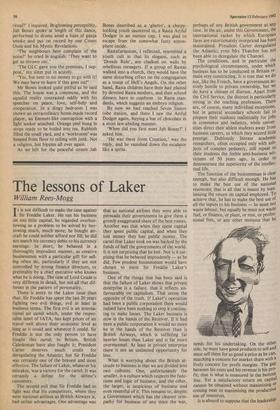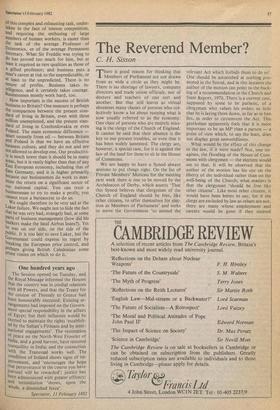The lessons of Laker
William Rees-Mogg
It is not difficult to make the case against Sir Freddie Laker. He ran his business on too little capital; he regarded overbor- rowing as a problem to be solved by bor- rowing much, much more; he bought air- craft he could neither afford nor fill; he did not match his currency debts to his currency earnings. In short, he behaved in a thoroughly imprudent manner, as creative businessmen with a particular gift for sell- ing often do, particularly if they are not controlled by strong finance directors, or preferably by a chief executive who knows what he is doing. The case of Lord Grade is very different in detail, but not all that dif- ferent in the pattern of personality.
There is more to the Laker issue than that. Sir Freddie has spent the last 20 years fighting two evil things, evil at least in business terms. The first evil is an interna- tional air cartel which, under the respec- table label of IATA, has kept prices of air travel well above their economic level as long as it could and wherever it could. Sir Freddie is not the only person to have fought this cartel; in Britain, British Caledonian have also fought it; President Carter deserves much credit for deregulating the Atlantic; but Sir Freddie was certainly one of the bravest and most effective. The failure of Laker, whatever his mistakes, was a victory for the cartel. It was certainly a defeat for the airline's customers.
The second evil that Sir Freddie had to fight was that his competitors, where they were national airlines as British Airways is, had unfair advantages. One advantage was that as national airlines they were able to persuade their governments to give them a grossly exaggerated share of the best routes. Another was that when they spent capital they spent public capital, and when they lost money they lost public money. The cartel that Laker took on was backed by the funds of half the governments of the world. It is not surprising that he lost. Nor is it sur- pising that he behaved imprudently — as he did. Few prudent businessmen would have chosen to enter Sir Freddie Laker's business.
One of the things that has been said is that the failure of Laker shows that private enterprise is a failure, that it reflects un- favourably on capitalism. That seems the opposite of the truth. If Laker's operation had been a public corporation there would indeed have been nothing to stop it continu- ing to make losses. The Laker business is now in the hands of the Receiver. If it had been a public corporation it would no more be in the hands of the Receiver than is British Airways, which is suffering far heavier losses than Laker and is far more overmanned. At least in private enterprise there is not an unlimited opportunity for loss.
What is worrying about the British at- titude to business is that we are divided into two cultures. One, unfortunately the smaller, is a culture which respects the func- tions and logic of business, and the other, the larger, is suspicious of business and even resentful of it. This remains so, despite a Government which has the clearest sym- pathy for business of any since the war, perhaps of any British government at any time. In the air, under this Government, the international racket by which European fares are extortionately overpriced has been maintained. President Carter deregulated the Atlantic; even Mrs Thatcher has not been able to deregulate the Channel.
The conditions, and in particular the psychological circumstances, under which business has to be conducted in Britain re- main very constricting. It is true that we do not, like the French, have a government ac- tively hostile to private ownership, but we do have a climate of distrust. Apart from the Civil Service, the distrust is particularly strong in the teaching profession. There are, of course, many individual exceptions, but in general secondary schools fail to prepare their students realistically for jobs in commerce and industry, while univer- sities direct their ablest students away from business careers, to which they accord little prestige. Dubiously literate academic researchers, often occupied only with sub- jects of complex pedantry, still repeat to their students the feeble anti-business wit- ticisms of 50 years ago, in order to demonstrate the superiority of the intellec- tual life.
The function of the businessman is clear enough, but also difficult enough. He has to make the best use of the national resources; that is all that is meant by max- imising the return on capital employed. To achieve that, he has to make the best use of all the inputs to his business — he must not waste labour, but equally he must not waste fuel, or finance, or plant, or rent, or profes- sional fees, or any other resource that he needs for his undertaking. On the other side, he must have good products to sell and must sell them for as good a price as he can, matching a concern for market share with a lively concern for profit margins. The gap between his costs and his revenue is his pro- fit; that is what is measured in the bottom line. Yet a satisfactory return on capital cannot be obtained without maximising or coming near to maximising the productive use of resources.
It is absurd to suppose that the leadership of this complex and exhausting task, under- taken in the face of intense competition, and requiring the enthusing of large numbers of human workers, is easier than the task of the average Professor of Economics, or of the average Permanent Secretary. What Sir Freddie was trying to do has proved too much for him, but at least it required as rare qualities as those of a gifted professor; and business puts a man's career at risk to the unpredictable, or at least to the unpredicted. There is no tenure of profits. Business takes in- telligence, and it certainly takes courage. Businessmen mostly work hard, too.
How important is the success of British business to Britain? One measure is perhaps the comparison between the present stan- dard of living in Britain, even with three Million unemployed, and the present stan- dard of living in Czechoslovakia or even Poland. The main economic difference apart recently from oil — between Britain and Poland is that we have an effective business culture, and they do not and are not allowed to develop one. Our productivi- ty Is much lower than it should be in many areas, but it is vastly higher than that of any East European economy, including that of East Germany, and it is higher primarily because our businessmen do work to max- Muse the return on a significant sector of our national capital. You can trust a businessman to try to make a profit; you Cannot trust a bureaucrat to do so.
We ought therefore to be very sad at the Laker failure. We ought not to hide the fact that he was very bad, strangely bad, at some Parts of business management (how did his 'lookers make the fatal Airbus loans?). Yet be was on our side, on the side of the Public. It is too late to save Laker, but the Government could express its regret by breaking the European price control, and Perhaps giving British Caledonian some Prime routes on which to do it.











































 Previous page
Previous page